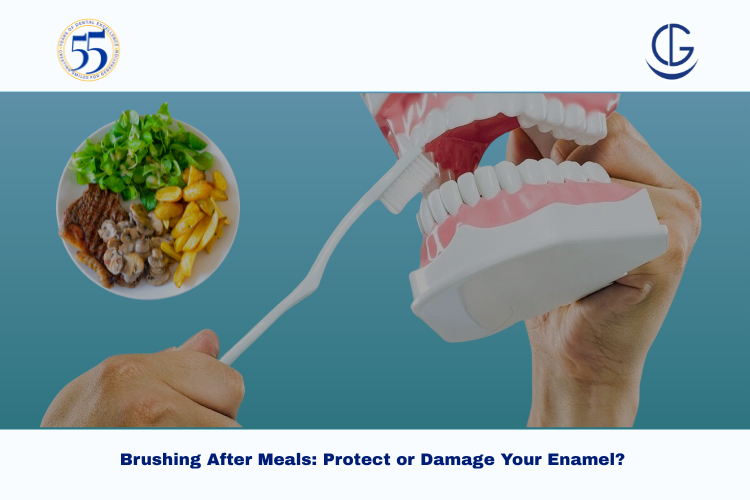Schedule Appointment



Maintaining oral hygiene is a cornerstone of good health. Naturally, many people assume that brushing after meals is a good practice to keep their teeth clean and fresh. But is it truly beneficial, or could it be harming your enamel? This is a question that dental experts, including those at Dr. Gowds Dental Hospital in Hyderabad, hear regularly.
In this blog post, we’ll break down whether brushing after meals is helpful or harmful, when and how to brush properly, and what alternatives you can use to protect your oral health. We’ll also dive into commonly searched questions like “Is brushing after eating bad?” and “Best time to brush your teeth after eating.”
It’s logical to think that brushing your teeth immediately after eating removes food particles and plaque, keeping your breath fresh and your teeth clean. Many people want to prevent cavities and gum disease by being proactive with their oral care. However, what you eat—and when you brush—can significantly affect the health of your tooth enamel.
Your tooth enamel is the hardest substance in your body, but it’s not invincible. When you eat, especially acidic or sugary foods, your mouth’s pH drops. This acidic environment temporarily softens your enamel, making it more susceptible to wear.
Brushing your teeth immediately after meals, particularly acidic ones (like citrus fruits, soda, coffee, or tomatoes), can actually damage softened enamel. Rubbing your toothbrush against enamel in this vulnerable state may lead to erosion over time.
According to most dental professionals, the ideal approach is to wait 30 minutes after eating before brushing your teeth. This gives your saliva enough time to neutralize the acids and remineralize your enamel.
Brush your teeth before breakfast to clean away overnight bacteria and plaque.
Always brush before bed, as this clears away food debris and helps reduce bacterial activity overnight.
If brushing after meals is necessary, especially if you eat sticky or sugary foods, rinse your mouth with water first and wait at least 30 minutes before using your toothbrush.
If you’re concerned about oral hygiene after meals but want to protect your enamel, try these options:
Swishing water in your mouth helps dilute and wash away acids and food particles without damaging enamel.
How to Use:
Rinse thoroughly for 20–30 seconds after meals.
Precaution:
This is not a substitute for brushing but can help maintain oral hygiene between brushes.
Chewing stimulates saliva production, which helps neutralize acids and clean the mouth naturally.
Benefits:
Precaution:
Avoid gum with sugar as it feeds harmful bacteria.
Dairy products are rich in calcium and phosphates, which strengthen enamel and balance oral pH.
How to Use:
Include a small piece of cheese after a meal to help remineralize your teeth.
Precaution:
Stick to unsweetened dairy products to avoid added sugars.
Antibacterial or fluoride mouthwashes can help kill bacteria and protect enamel if used properly.
Benefits:
Precaution:
Choose a non-alcoholic formula to avoid drying out your mouth.
Yes—if you’ve eaten foods that are sticky, sugary, or strong-smelling (like onions or garlic), brushing might be the best option. But again, timing is key. Wait at least 30 minutes and rinse with water first.
Whether you brush after meals or not, the type of brush matters. Soft-bristled toothbrushes are gentle on enamel and gums, reducing the risk of erosion and gum recession.
At Dr. Gowds Dental Hospital, we advise patients to develop an oral care routine that aligns with their lifestyle while safeguarding enamel. Brushing after meals can be done safely if you follow proper timing and use gentle brushing techniques.
So, is brushing after meals a good habit or a bad one? The answer depends on what you’ve eaten and when you brush. Done correctly—with proper timing and tools—it can support your oral health. Done hastily, it can harm your enamel over time.
Instead of brushing immediately, try rinsing, chewing sugar-free gum, or eating a piece of cheese. And always consult a dentist if you’re unsure about your oral care routine. The specialists at Dr. Gowds Dental Hospital are here to guide you with personalized dental advice for a healthier smile.
Brushing after meals isn’t always harmful for your teeth, however, brushing immediately after a meal, especially any acidic foods can weaken your enamel, and can wear down your enamel.
Typically, it would be best to wait at least 30 minutes after eating, to allow enough time for your saliva to neutralize the acids so that your enamel is protected against erosion.
Yes, you can brush after every meal, but again it is necessary to wait 30 minutes minimum to allow your saliva time to neutralize the acids. Using a soft-bristled brush along with fluoride-containing toothpaste will cause less wear to the enamel.
Rinsing with water is not an acceptable alternative to brushing, however, it would be helpful to use it to perhaps reduce acidity, to help remove food particles until it is safe to brush.
The empathetic dental professionals at Dr. Gowds Dental Hospital in Hyderabad situated in Dr. Gowds Medical and Dental Clinic recommended waiting a minimum of 30 minutes to brush, after eating and drinking, to protect the enamel from damage due to acidic erosion.